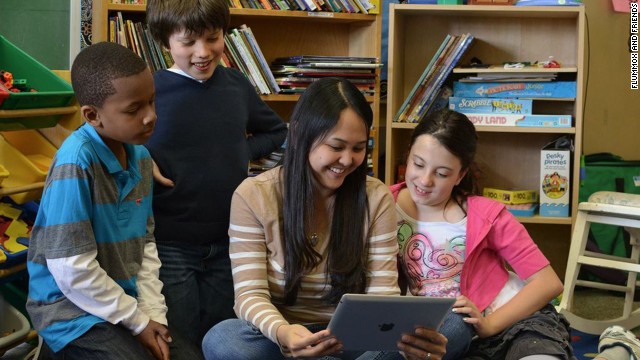
photo credit: CNN
My kids think that our iPad is a magical game-playing machine. Seriously. They think that the apps that I’ve installed over years of reviewing are the only thing the iPad is good for. Heaven forbid I should open up the browser while they’re watching – their eyes get big, like they’re witnessing something borderline blasphemous and want to look away but they can’t.
Of course, as grown-ups we know that tablets are much more useful than keeping kiddos happy in the grocery store. Over the last few years they have been almost fully integrated into our local school district, with teachers all receiving an iPad Mini to use during the school year. My mom, who has been teaching for over 30 years, can now create presentations and quizzes on her Mini and project them onto her in-class technology without one of those outdated light projector tables. She’s pretty impressed.
Increased popularity of tablets and the growing accessibility to the technology has also tremendously helped educators, parents, and caregivers of special needs kids. Tools used to help communicate with children with autism spectrum disorders – things like visual schedules and picture charts of emotional reactions – have been transformed into streamlined apps and programs that only require taps and swipes. It can cut down the time it takes to prepare those tools and reduce the cost of the materials, something that’s an obstacle in specialized programs within the public school system.
There are some, however, who feel that tablets will allow children with autism to further disconnect socially from the world. Many parents limit the tablet time allowed to their children for fear that the games or apps will distort the image of “reality” that special needs kids have difficulty understanding. While the apps and the technology have come a long way in the past 4 years, there are still those who maintain a healthy skepticism on the long-term benefits of adding tablets into daily routines – either as a toy or a tool.
Heather Kelly at CNN.com sums up the benefits of using tablets when used as a tool and not a toy: children with autism can use the tablets to communicate, boost independence, and engage in activities that can appeal to special needs kids, like repeatedly watching YouTube videos. You can read more of her article here.
Do you think tablets are a good tool for helping children with special needs? Why or why not? Share in the comments section below!



